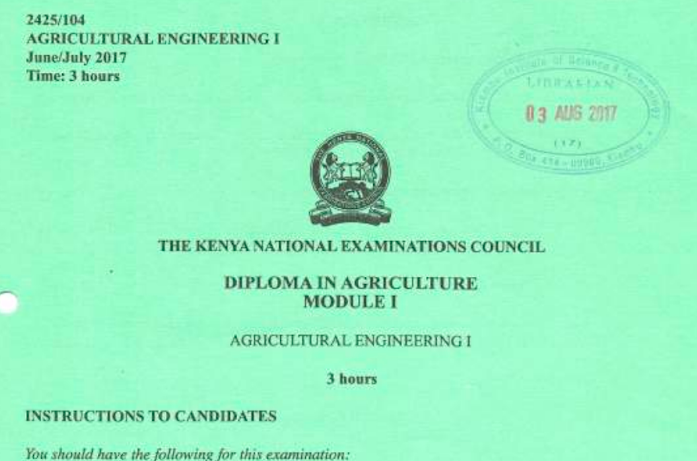Get free Diploma in agriculture module 1 KNEC past papers on this site inclusive of all units. We have compiled you several KNEC past papers from past years both July and November KNEC series to help you get started and improve your learning.
Diploma in agriculture module 1 units
- Agricultural engineering 1
- Agricultural extension education 1
- Agricultural economics
- Animal production 1
- Principles of animal production
- Principles of crop production 1
- Soil science
This is the full list of Diploma in agriculture module 1 units which are examined by KNEC and are available for download in pdf format on this page.
Get comprehensive access of all Diploma in agriculture module 1 KNEC past papers for free. All you need to do is to download the papers to save them on your device for free in soft copy format
If you find this article helpful we kindly urge you to subscribe to our newsletters using your email to receive timely updates, also share this site with your fellow students and friends so that they can learn and benefit from our free resources.
Benefits of KNEC past papers
As a student of Diploma in agriculture module 1, it is important to have these KNEC past papers because;
- It improves learners knowledge
- Helps you understand the units taught
- Gives the learners insight on what kind of questions to expect
- Prepares learners for their main end of course exam.
- Supplements learner’s education.
Diploma in agriculture module 1 KNEC past papers pdf download
- Agricultural engineering 1 KNEC past papers
- Agricultural extension education 1 KNEC past papers
- Agricultural economics KNEC past papers
- Animal production 1 KNEC past papers
- Principles of animal production KNEC past papers
- Principles of crop production 1 KNEC past papers
- Soil science KNEC past papers
Agricultural engineering 1 course outline
Agricultural Engineering unit is the field of study and application of engineering science and designs principles for agricultural purposes, combining the various disciplines of mechanical, science , food, software and chemical engineering to improve the efficiency of farms and agribusiness enterprises as well as to ensure sustainability of natural and renewable resources.
Agricultural extension education 1 course outline
Agricultural Extension unit is an informal educational process directed toward the rural population. This process offers advice and information to help them solve their problems. Extension also aims to increase the efficiency of the family farm, increase production and generally increase the standard of living of the farm family.
Agricultural economics course outline
Agricultural economics unit is an applied field of economics concerned with the application of economic theory in optimizing the production and distribution of food and fiber. Agricultural economics influences food policy, agricultural policy, and environmental policy. In general, agricultural economics study has contributed to the fields of research and training, smallholder and rural development, project planning and management, and the formulation, planning and analysis of macro-policy.
Animal production 1 course outline
This unit discusses the role of animal production systems in a sustainable society; sustainability problems within animal production systems; and four measures for the improvement of the contribution to societal sustainability from animal production. This unit discuses the advantages of animal production which include; Raising animals humanely can use less feed, fuel and water than intensive farming, reducing costs and pollution. Humane farms can create jobs, boost profits and keep local food supplies healthy. By farming crops and livestock, humane farms can reduce environmental damage – recycling nutrients and improving the soil.
Principles of animal production course outline
This unit develops general skills and knowledge of the principles of efficient production including, feeding, breeds, management practices, housing, diseases, reproduction and marketing of livestock.
Principles of crop production 1 course outline
This unit discusses Field crop production process: Land preparation, propagation and planting, soil moisture management, management of pests (weeds, insect pests, and pathogens), crop nutrition management, harvesting, and postharvest handling. The principles of crop production include; preparation of soil, sowing, adding manure and fertilizers, irrigation, weeding, harvesting and proper storage.
Soil science course outline
Soil science unit is the science dealing with soils as a natural resource on the surface of the Earth including soil formation, classification, and mapping; physical, chemical, biological, and fertility properties of soils; and these properties in relation to the use and management of the soils. fields of application of soil science include;
- Soil survey.
- Soil management.
- Standard methods of analysis.
- Soil fertility / Nutrient management.
- Ecosystem studies.
- Climate change.
- Watershed and wetland studies.
MORE FREE KNEC PAST PAPERS:
Choose your course and grab KNEC past papers here;
- Diploma in science laboratory technology knec past papers
- Diploma in petroleum geoscience knec past papers
- Diploma in medical laboratory KNEC past papers
- Diploma in analytical chemistry knec past papers
- Diploma in environmental science knec past papers
- Diploma in applied biology knec past papers
- Diploma in social work knec past papers
- Diploma in business management knec past papers
- Diploma in human resource management knec past papers
- Diploma in sales and marketing KNEC past papers
- Diploma in nutrition and dietetics knec past papers
- Diploma in food and beverage KNEC past papers
- Diploma in catering and accommodation KNEC past papers
- Diploma in environmental science & technology KNEC past papers
- Diploma in sustainable agriculture and rural development KNEC past papers
- Diploma in civil engineering KNEC past papers
- Diploma in building and construction KNEC past papers
- Diploma in architecture KNEC past papers
- Diploma in general agriculture KNEC past papers
- Diploma in mechanical engineering KNEC past papers
- Diploma in automotive engineering KNEC past papers
- Diploma in electrical and electronic engineering KNEC past papers
- Diploma in ICT KNEC past papers pdf
- Certificate in electrical and electronic engineering KNEC past papers
- Certificate in ICT KNEC past papers pdf
- Diploma in road transport management knec past papers
- Certificate in sales and marketing knec past papers
- Certificate in general agriculture KNEC past papers
- Certificate in building and technology KNEC past papers
- Certificate in automotive engineering KNEC past papers
- Certificate in mechanical engineering KNEC past papers
- Certificate in food and beverage KNEC past papers
- Certificate in catering and accommodation KNEC past papers
- Certificate in human resource management knec past papers
- Certificate in secretarial studies knec past papers
- Certificate in supply chain management knec past papers
- Certificate in fashion design knec past papers
- Certificate in science laboratory technology knec past papers
- Diploma in fashion design knec past papers pdf
- Diploma in supply chain management knec past papers


I need 2020-2021 diploma in general agriculture
we shall update them soon
I need 2018-2022knec past papers diploma in general agriculture module1